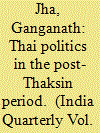| Srl | Item |
| 1 |
ID:
193136


|
|
|
|
|
| Summary/Abstract |
It is often asserted that the Thai public, particularly members of the urban middle class in Bangkok, are inherently conservative, leading them to support mass protests preceding recent military coups. What is often overlooked is that support for these movements has not been consistent, with polls suggesting that at many points, the Bangkok public has opposed these protests. This prompts the question: why has the broader public supported anti-democratic conservative moments at key moments, but not others? This article argues that Thai conservative movements have received support when they engage in populism, in contrast to when these movements revert to more traditional, authoritarian mobilization tactics. This points to the possible existence of an alternative strand of Thai conservatism, one this article tentatively terms populist conservatism. Paying attention to this vague, yet powerful symbol of “the People” offers a more plausible explanation for the successes and failures of modern Thai conservative movements.
|
|
|
|
|
|
|
|
|
|
|
|
|
|
|
|
| 2 |
ID:
109036


|
|
|
|
|
| Publication |
2011.
|
| Summary/Abstract |
hailand has been witnessing political uncertainties ever since the ouster of Prime Minister Thaksin Shinawatra. Although the 1997 Constitution of Thailand was one of the best in terms of evolving democratic institutions and Thaksin was one of the most popular leaders, yet the system could not work. Thaksin was disliked by the traditionally entrenched elite who joined together to remove him arbitrarily from power in which the military and the Royal Privy Council took a prominent part. The system that was adopted under military rule did not like to retain the 1997 constitution but decided to replace them with a new constitution (2007), in which the interests of the military were protected and promoted. In the evolving permutations and combinations, two groups-Yellow Shirts and Red Shirts-have emerged to oppose each other, often violently, to offer thesis and anti-thesis for and against Thaksin and his brand of politics. This article has tried to understand the dynamics of power politics in Thailand, the rise of the Yellow Shirts and Red Shirts and the emerging problems that Thailand will have to address in the future.
|
|
|
|
|
|
|
|
|
|
|
|
|
|
|
|